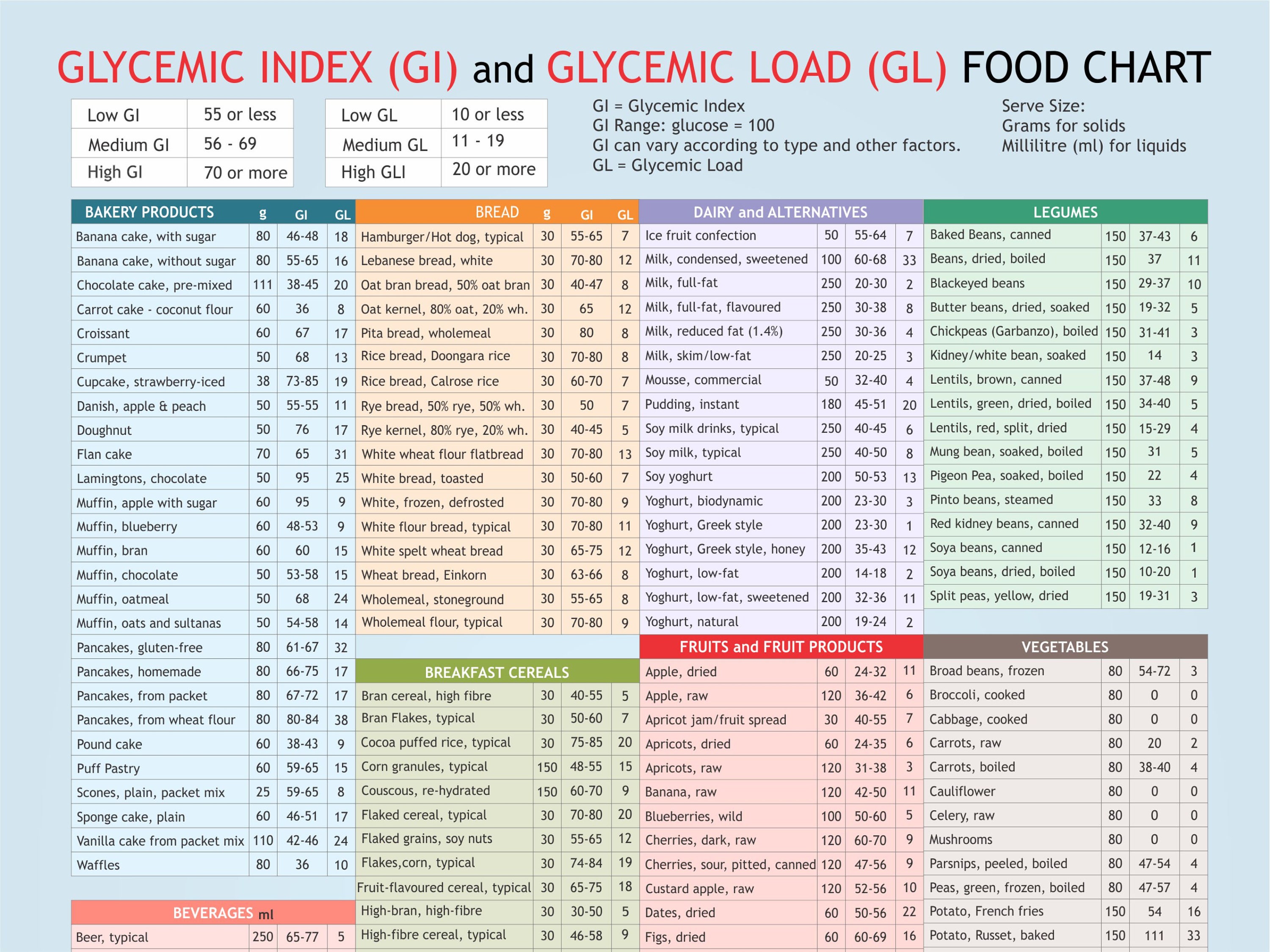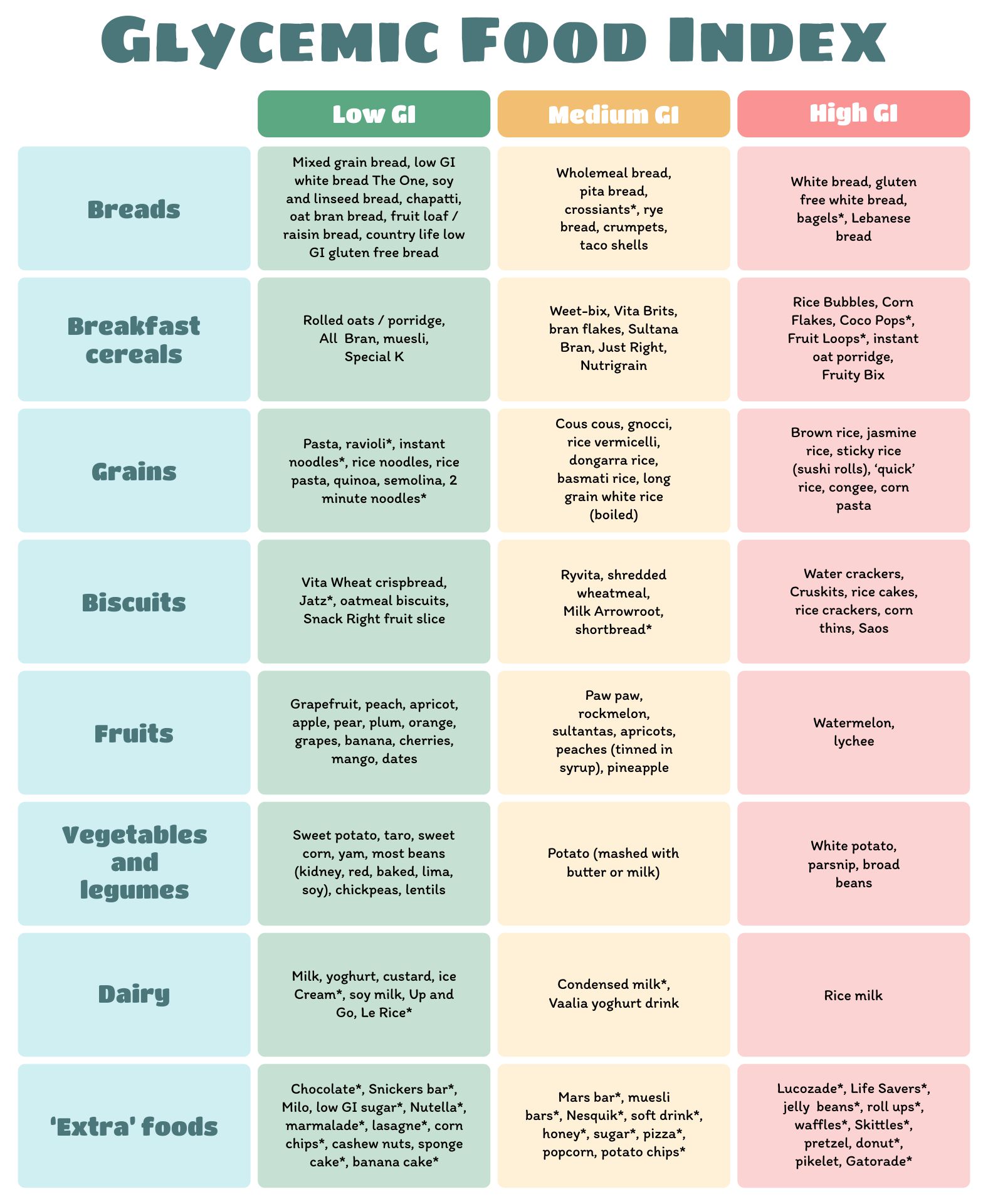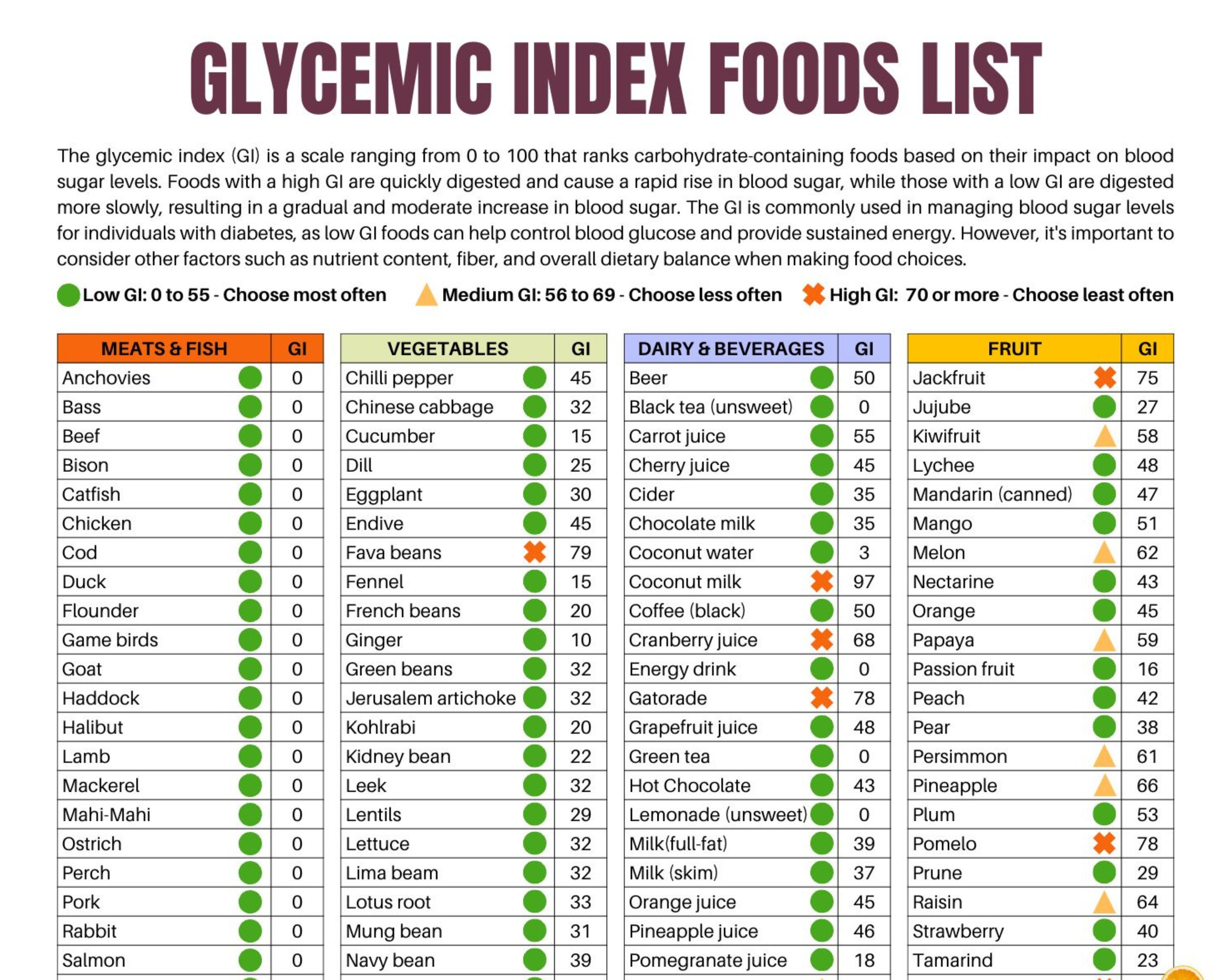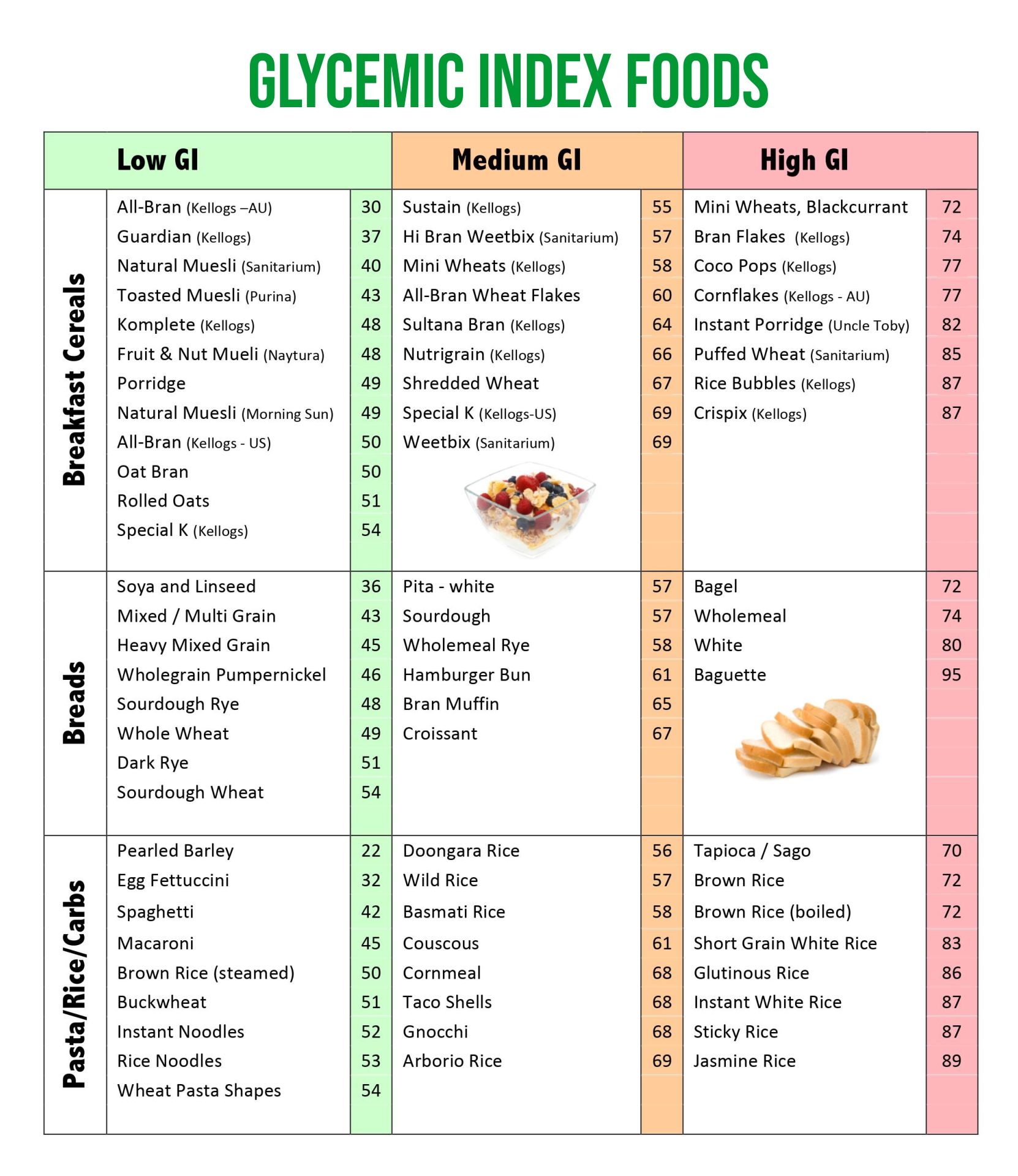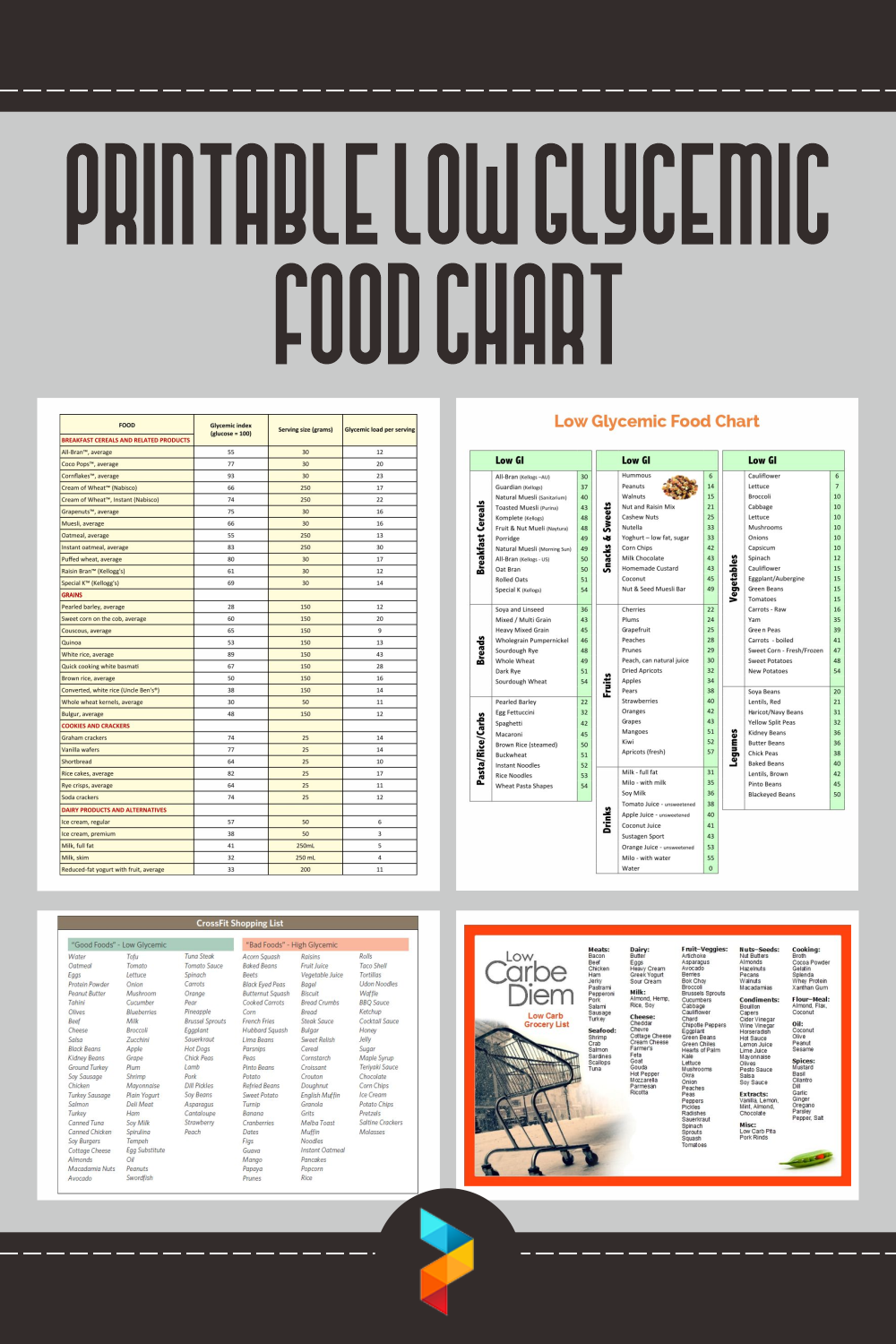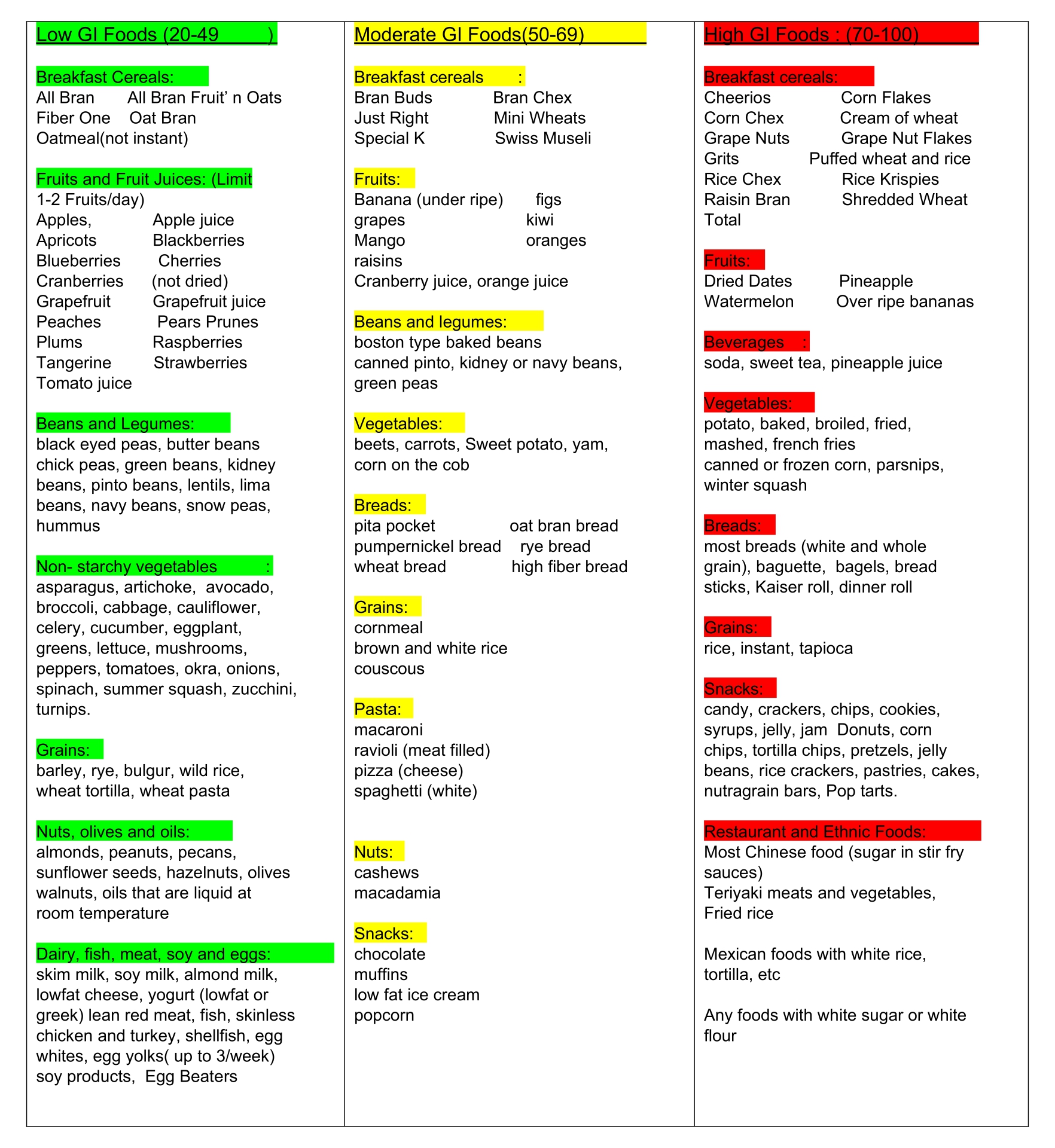Glycemic Index Food Chart Printable
Glycemic Index Food Chart Printable - Web the glycemic index chart below uses a scale of 1 to 100 for glycemic index and 1 to 50 for glycemic load values, glucose having the highest gi value of 100 and gl of 50. A large part of it is making choices about the foods you eat. The standardized glycemic index ranges from 0. White bread, rice cakes, most crackers, bagels, cakes, doughnuts, croissants, most packaged breakfast cereals. The general gi thresholds, per the american diabetes association (ada), are: What is the glycemic index? Web the glycemic index classifies foods that contain carbohydrates according to their potential to raise blood sugar. Blood sugar levels are raised after a person eats foods containing carbohydrates (sugars and starches). This article explains the glycemic index and how it works. They are grouped according to range and food type. The following table provides the glycemic index (gi) and glycemic load (gl) values of selected foods. What is the glycemic index? Web the glycemic index, or gi, uses a scale of numbers from 1 to 100 to rank carbohydrate foods by how quickly a serving size of each raises blood sugar. This article explains the glycemic index and how it works. A large part of it is making choices about the foods you eat. The glycemic load measurements are as follows: Foods are categorized as low gi (55 or less), medium gi (56 to 69) and high gi (70 or more). High glycemic index (gi of 70 or higher): Foods high on the glycemic index release glucose rapidly. Web what is glycemic index? Web the glycemic index, or gi, uses a scale of numbers from 1 to 100 to rank carbohydrate foods by how quickly a serving size of each raises blood sugar. But, with information scattered everywhere, hard to keep track. Managing diabetes from day to day is up to you. Complete up to date table of glycemic index values collected from all available studies. Foods are categorized as low gi (55 or less), medium gi (56 to 69) and high gi (70 or more). They are grouped according to range and food type. Foods with a high gi increase blood sugar higher and faster than foods with a low gi. A large part of it is making choices about the foods you eat. High glycemic index (gi of 70 or higher): The glycemic index of a food refers to the effect the food has on the body’s blood sugar levels. Web the glycemic index classifies foods that contain carbohydrates according to their potential to raise blood sugar. Everyone knows that vegetables are healthier than cookies. But there are also best choices within each food group. Eating foods with a lower gi may result in a more gradual rise in your blood sugar level. This is a function of the type. Growing up, you were probably told to limit sweets. The glycemic load measurements are as follows: For instance a food with a glycemic index of 30 doesn’t raise the blood glucose that much at all , but gi doesn’t consider how big the serving size is or how. Need a simple, printable chart putting it all in one place for. 20 = high glycemic load. Web the glycemic index (gi) is a measure of how fast a food raises the blood sugar level. The lower a food is on the gi, the lower the effect on your blood sugar. Web to help you understand how the foods you are eating might impact your blood glucose level, here is an abbreviated. Web the glycemic load is a measurement of how greatly blood sugar is affected by a certain food. Foods with a higher gi value are more likely to spike your blood sugar than foods with a lower gi. Need a simple, printable chart putting it all in one place for easy reference. Foods are categorized as low gi (55 or. There are three gi categories: Web what can i eat? 20 = high glycemic load. Web the glycemic index classifies foods that contain carbohydrates according to their potential to raise blood sugar. A large part of it is making choices about the foods you eat. High glycemic index (gi of 70 or higher): A large part of it is making choices about the foods you eat. Web glycemic index and glycemic load food chart. This article explains the glycemic index and how it works. The lower a food is on the gi, the lower the effect on your blood sugar. Web october 21, 2021 / diet, food & fitness / nutrition. Web the glycemic index is a value assigned to foods based on how quickly and how high those foods cause increases in blood glucose levels. They are grouped according to range and food type. Foods are categorized as low gi (55 or less), medium gi (56 to 69) and. Web this page provides a comprehensive gi index chart and their corresponding glycemic index and glycemic load values for easy reference. The lower a food is on the gi, the lower the effect on your blood sugar. Web the glycemic index, or gi, uses a scale of numbers from 1 to 100 to rank carbohydrate foods by how quickly a. Web to help you understand how the foods you are eating might impact your blood glucose level, here is an abbreviated chart of the glycemic index and glycemic load, per serving, for more than 100 common foods. The standardized glycemic index ranges from 0. The glycemic index charts below lists common foods followed by their serving size and glycemic index. Foods with a high gi increase blood sugar higher and faster than foods with a low gi. The following table provides the glycemic index (gi) and glycemic load (gl) values of selected foods. The general gi thresholds, per the american diabetes association (ada), are: Foods with high glycemic index values tend to raise blood sugar higher, faster and for a. Folks trying to manage blood sugar, lose weight, or just aiming for a healthier diet often find navigating food choices tricky. They are grouped according to range and food type. Foods low on the glycemic index (gi) scale tend to release glucose slowly and steadily. Healthy food choices for people with diabetes. The following table provides the glycemic index (gi) and glycemic load (gl) values of selected foods. Foods with higher glycemic index values are at the top of the table, while foods with lower glycemic index values are at the end of the table. Web the glycemic load is a measurement of how greatly blood sugar is affected by a certain food. Growing up, you were probably told to limit sweets. It is a sign of the quality of carbohydrates in the food. Web the glycemic index is a value assigned to foods based on how quickly and how high those foods cause increases in blood glucose levels. Knowing which foods are lower in glycemic index (gi) can help manage blood sugar. Foods with a higher gi value are more likely to spike your blood sugar than foods with a lower gi. Web pure glucose itself has a gi of 100. Low glycemic foods slow down sugar absorption, helping in maintaining stable glucose levels. Web this page provides a comprehensive gi index chart and their corresponding glycemic index and glycemic load values for easy reference. If a food has a high glycemic load, then it rapidly raises blood sugar levels.Glycemic Index, Glycemic Load, Food List Chart, Printable Planner
Low Glycemic Food Chart 20 Free PDF Printables Printablee
Glycemic Index Foods List Ataglance 2 Page Pdf PRINTABLE DOWNLOAD
Low Glycemic Index Food Chart List Printable
10 Best Printable Low Glycemic Food Chart
Pin on 17 day diet
What is Glycemic Index & Glycemic Load? Low GI foods and Weight Loss
Glycemic Index Chart 6 Free Templates in PDF, Word, Excel Download
Glycemic Index Chart Printable
glycemic index food list printable Glycemic Index Foods The Safe
Foods With High Glycemic Index Values Tend To Raise Blood Sugar Higher, Faster And For A Longer Time Than Do Foods With Lower Values.
20 = High Glycemic Load.
Foods With A High Gi Increase Blood Sugar Higher And Faster Than Foods With A Low Gi.
Foods With A Low Gi.
Related Post:
